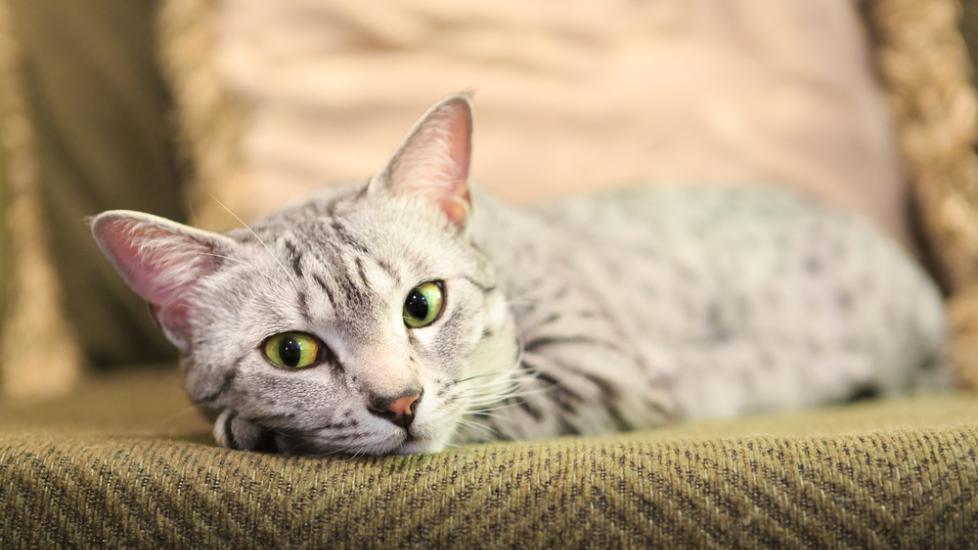Pneumonia (Bacterial) in Cats
While pneumonia refers to an inflammation of the cat's lungs, bacterial pneumonia refers specifically to an inflammation of the lungs in response to a disease-causing bacteria. This inflammation is characterized by an accumulation of cells and fluid in the lungs, airways, and alveoli (the portion of the airways in which oxygen and carbon dioxide are exchanged).
Prognosis for bacterial pneumonia is generally good if properly treated. However, there are two secondary effects (hypoxemia and sepsis) that may result from bacterial pneumonia, and which are associated with increased fatalities. Hypoxemia refers to severely low levels of oxygen in the blood, while sepsis refers to the presence of pus-forming bacteria and their poisons in the cat's blood stream.
Bacterial pneumonia may occur in both dogs and cats, although this condition is more common in dogs. If you would like to learn more about how this disease affects dogs, please visit this page in the PetMD health library.
Symptoms and Types
Symptoms of bacterial pneumonia include cough, fever, difficulty breathing, lack of appetite and consequent weight loss, sluggishness, nasal discharge, dehydration, and rapid breathing. Intolerance to exercise due to breathing difficulties may also be apparent. Listening to the lungs with a stethoscope may reveal abnormal breathing sounds, a diagnostic process known as auscultation. Symptoms may include short rough snapping sounds known as crackles and whistling sounds known as wheezes.
Causes
Causes of bacterial infection in a cat's lungs may vary -- no single bacterium is responsible for this condition. In cats, the bacterial organisms Bordetella bronchiseptica, Pasteurella, and Moraxella are most frequently reported in cases of bacterial pneumonia. Although, cats seem less likely to contract bacterial pneumonia than dogs.
Some risk factors that may increase the risk of bacterial pneumonia include a pre-existing viral infection, difficulty swallowing, metabolic disorders, and regurgitation.
Diagnosis
Bacterial pneumonia is just one cause of pulmonary dysfunction. Additional causes may include aspiration pneumonia, in which the lungs become inflamed due to inhalation of material, such as a foreign body, or vomit. The symptoms of bacterial and aspiration pneumonia may be similar, and diagnosis must properly determine between them in cases of pulmonary dysfunction.
If bacterial pneumonia is suspected, there are a number of diagnostic procedures that may be done on the cat. A tracheal wash may be performed to gather material (fluids and cells) lining the trachea for analysis. Because the bacteria cannot always be seen via microscope, any specimens taken should be cultured for further examination. Other tests may include visual imaging, specifically X-rays of the cat's chest and lungs. Blood analysis, and urine analysis tests will also be conducted.
Treatment
Medication is necessary in cases of bacterial pneumonia; the proper antimicrobial can be selected based on results of bacterial cultures taken from a tracheal wash, for example. Additional treatment depends on the severity of signs. If multiple symptoms occur, such as anorexia, high fever, and weight loss, your cat will be actively treated in a hospital to start.
If respiratory distress is apparent, oxygen therapy may be necessary. To avoid dehydration, the veterinarian may recommend administering electrolytes by intravenous (IV) fluid therapy.
Restrict your cat's activities throughout treatment, except as part of physiotherapy, or to help improve clearing of the lungs and airways. Along with rest, be attentive to your cat's needs, and prevent it from lying in one position for long periods of time.
Living and Management
After initial treatment, your cat should be fed a diet high in protein and energy density. Your veterinarian will monitor your cat's progress with blood tests, and if needed, x-rays of the chest and lung cavity. Any prescribed antimicrobial medications should be administered regularly, as prescribed by your veterinarian.
Prevention
One way in which bacterial pneumonia can be prevented is by ensuring that your cat receives its regular vaccinations.
